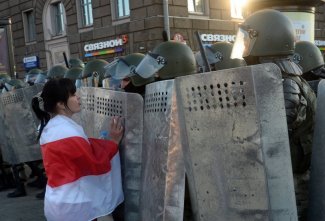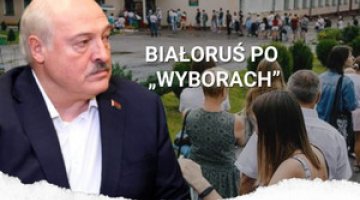The Belarusian deadlock. Another week of protests

Mass protests were seen again on 20 September in Minsk. Around 100,000 people participated in them. Several thousand people also took to the streets of oblast capital cities (including Hrodna, Brest and Homel) and regional capital cities (including Lida and Navapolatsk). Law enforcement agencies used the tactic of isolating demonstrators to make it difficult for them to move In Minsk heavy armoured equipment blocked access to important government facilities and water cannons were brought to the streets. Most demonstrations were peaceful, though some clashes between the demonstrators and OMON officers did happen. According to the Viasna organisation, over 200 people have been detained. One of the reasons the Sunday demonstrations attracted so many participants was due to the suppression of the traditional women's march in Minsk (5,000–7,000 participants) on Saturday. According to the Ministry of Internal Affairs, 390 people were detained during the march. Most of them were released a few hours later.
New methods of protest against the regime were used last week. Nexta, a Belarusian activist on Telegram, led a campaign to gather and publish the personal data of around 2,000 identified law enforcement officials who had used physical coercion against demonstrators. Another example of anti-government activity is the operation of the so-called cyber guerrillas, a group formed by Belarusian IT specialists. Their goal is to disrupt the functioning of the regime’s websites (including those of the Ministry of the Internal Affairs and the tax service). Signatures are collected under appeals to dismiss Lukashenka and hold a new election at some workplaces, but the range of this initiative is not large.
In an interview on 20 September for the Russian RBK news website, Sviatlana Tsikhanouskaya once again emphasised that the political crisis in Belarus is a protest against Lukashenka, and Belarusians do not intend to turn their backs on Russia. She also confirmed her earlier words that the integration agreements with Moscow, which may be signed by Lukashenka in the near future, will be verified in terms of compliance with the national interest after he is removed from power.
On 16 September, Russia's Defence minister, Sergey Shoygu was on a working visit in Minsk. During the meeting with Lukashenka and the senior officials from the Belarusian Ministry of Defence, it was agreed that the Russian-Belarusian Slavic Brotherhood exercises taking place near Brest would be prolonged until 25 September. It was also announced that bilateral training activity would be intensified in October. One day later, Lukashenka announced that due to the hostile policies of Poland, Lithuania and Ukraine, he was forced to redirect military units to the western border in order to ‘close’ it.
Commentary
- The number of protesters has not decreased visibly in effect of repressive measures used against them. Each of the last three Sunday marches in Minsk has been invariably attended by around 100,000 people. However, the demonstrators have become slightly less active in the provinces and on weekdays. Although there were more clashes with OMON units last Sunday than in the previous weeks, these were still isolated cases. The public anger over Lukashenka's retention of power does not radicalise the protests, although the mood is gradually becoming more strained as the protest continues, especially among some of the demonstrators who are not afraid of physically opposing the law enforcement agencies. At the same time, the self-organisation of anti-regime initiatives is improving. Social networks continue collecting and publishing the personal data of officers reporting to the Ministry of Internal Affairs. This initiative may undermine the morale, for example in the units reporting to the Ministry of Internal Affairs, but at the same time it may be used by the government to consolidate the law enforcement structures in opposing the protesters. The so-called ‘cyber guerrillas’ disrupting the regime's IT system are also becoming increasingly active.
- The government continues to stick to a ‘wait and see’ approach: it has not decided whether to resume brutal repressions on a massive scale or to take political action to calm the public mood in the foreseeable future. It is, though, continuing to artificially create a sense of external threat, and Moscow's support contributes to this. The Russian Defence minister’s visit to Minsk once again confirmed that the guarantee of the unrestricted operation of Russian armed forces in Belarusian territory is very important to the Kremlin. It was also a signal to NATO and the US that Moscow is determined to support the Lukashenka regime. The announcement of intensified Belarusian-Russian military exercises seems to suggest that the participation of units of the Russian Armed Forces, which will be trained on Belarus’s territory, may take the form of a rotational military presence, depending on how the political situation develops.
- Lukashenka's declaration that the Belarusian borders would be closed was also intended to prove the regime's propaganda thesis that the country faces an external threat. In fact, checks on Belarusian citizens have been tightened at border crossings and the pace of freight transport clearance has slowed down. The government’s assertive stance on the criticism expressed by most EU countries regarding the situation in Belarus was voiced on 18 September by the Minister of Foreign Affairs, Vladimir Makei. He stated that, were sanctions to be imposed on Belarus, it might respond by applying ‘radical measures’, reducing the intensity of international contacts and imposing retaliatory sanctions, including reducing the freedom of operation of foreign media organisations. He also mentioned the possibility of breaking off diplomatic relations with a country pursuing an unfriendly policy towards Belarus as an extreme and hypothetical variant.
- The activity of the Coordination Council is still focused on promoting the demand to schedule a new presidential election and emphasising that the opposition does not represent anti-Russian views, although it is critical of the Kremlin's contacts with Lukashenka. The council is also continuing its efforts to gain international support and earn a durable status as an interim centre of governance. Emphasising the lack of animosity towards Russia and giving signs of a readiness to establish contact with its government are important elements of Tsikhanouskaya's tactics. These tactics are primarily intended to disavow the allegations from Moscow and Minsk that she is a Western puppet who wants to restrict Belarus's relations with Russia.




